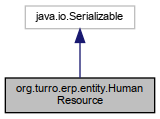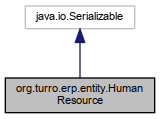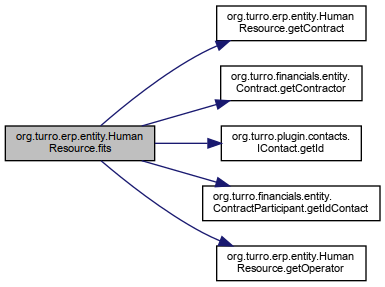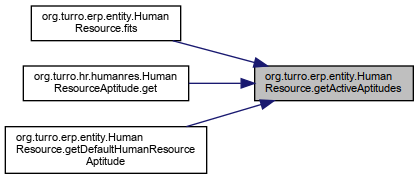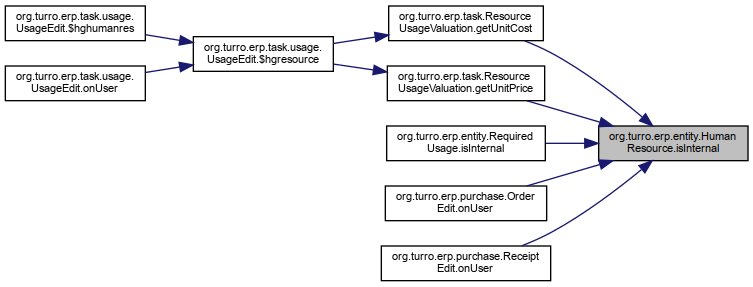◆ fits() [1/2]
| boolean org.turro.erp.entity.HumanResource.fits |
( |
AptitudeDegree |
required, |
|
|
Date |
now |
|
) |
| |
Definition at line 176 of file HumanResource.java.
Collection< OwnedAptitude > getActiveAptitudes(Date date)
◆ fits() [2/2]
| boolean org.turro.erp.entity.HumanResource.fits |
( |
IContact |
contact | ) |
|
Helpers
Definition at line 168 of file HumanResource.java.
171 return contact !=
null &&
172 ((contract !=
null && contract.getContractor().equals(contact.getId())) ||
173 (participant !=
null && participant.getIdContact().equals(contact.getId())));
ContractParticipant getOperator()
◆ getActiveAptitudes()
| Collection<OwnedAptitude> org.turro.erp.entity.HumanResource.getActiveAptitudes |
( |
Date |
date | ) |
|
Definition at line 189 of file HumanResource.java.
190 CheckDate cd =
new CheckDate(date);
191 ArrayList<OwnedAptitude> soo =
new ArrayList<OwnedAptitude>();
193 if(cd.isDateActive(oo.getInitialDate(), oo.getFinalDate())) {
List< OwnedAptitude > getOwnedAptitudes()
◆ getContract()
| Contract org.turro.erp.entity.HumanResource.getContract |
( |
| ) |
|
◆ getCostHour()
| double org.turro.erp.entity.HumanResource.getCostHour |
( |
| ) |
|
◆ getDefaultHumanResourceAptitude()
Definition at line 208 of file HumanResource.java.
209 HumanResourceAptitude hra =
null;
211 hra =
new HumanResourceAptitude(
this,
false, oo.getAptitudeDegree());
212 if(oo.isDefaultDegree())
break;
◆ getId()
| long org.turro.erp.entity.HumanResource.getId |
( |
| ) |
|
◆ getIdContract()
| long org.turro.erp.entity.HumanResource.getIdContract |
( |
| ) |
|
◆ getIdOperator()
| long org.turro.erp.entity.HumanResource.getIdOperator |
( |
| ) |
|
◆ getMarketPrice()
| double org.turro.erp.entity.HumanResource.getMarketPrice |
( |
| ) |
|
◆ getName()
| String org.turro.erp.entity.HumanResource.getName |
( |
| ) |
|
◆ getOperator()
◆ getOwnedAptitudes()
| List<OwnedAptitude> org.turro.erp.entity.HumanResource.getOwnedAptitudes |
( |
| ) |
|
◆ getPriceHour()
| double org.turro.erp.entity.HumanResource.getPriceHour |
( |
| ) |
|
◆ isActive()
| boolean org.turro.erp.entity.HumanResource.isActive |
( |
| ) |
|
◆ isInternal()
| boolean org.turro.erp.entity.HumanResource.isInternal |
( |
| ) |
|
◆ prepareForSaving()
| void org.turro.erp.entity.HumanResource.prepareForSaving |
( |
| ) |
|
Definition at line 180 of file HumanResource.java.
182 name = c.getIContractor().getName();
185 name = cp.getName() +
" - " + name;
◆ setActive()
| void org.turro.erp.entity.HumanResource.setActive |
( |
boolean |
active | ) |
|
◆ setContract()
| void org.turro.erp.entity.HumanResource.setContract |
( |
Contract |
contract | ) |
|
◆ setCostHour()
| void org.turro.erp.entity.HumanResource.setCostHour |
( |
double |
costHour | ) |
|
◆ setId()
| void org.turro.erp.entity.HumanResource.setId |
( |
long |
id | ) |
|
◆ setIdContract()
| void org.turro.erp.entity.HumanResource.setIdContract |
( |
long |
idContract | ) |
|
◆ setIdOperator()
| void org.turro.erp.entity.HumanResource.setIdOperator |
( |
long |
idOperator | ) |
|
◆ setMarketPrice()
| void org.turro.erp.entity.HumanResource.setMarketPrice |
( |
double |
marketPrice | ) |
|
◆ setName()
| void org.turro.erp.entity.HumanResource.setName |
( |
String |
name | ) |
|
◆ setOperator()
◆ setOwnedAptitudes()
| void org.turro.erp.entity.HumanResource.setOwnedAptitudes |
( |
List< OwnedAptitude > |
ownedAptitudes | ) |
|
◆ setPriceHour()
| void org.turro.erp.entity.HumanResource.setPriceHour |
( |
double |
priceHour | ) |
|
The documentation for this class was generated from the following file:
